Choline is an essential nutrient that helps with cognitive function, muscle health, liver function, and especially prenatal development. For this reason, it is found in many prenatal vitamins.
Pregnant women should be especially conscious of their choline intake, as a raft of scientific evidence has shown that it plays a critical role in fetal development.
Choline is found in small amounts in foods like eggs, cheese, seafood, and peanuts, and is available in supplemental form as well, but its importance wasn’t recognized until recently.
Technically, it isn’t classified as a vitamin, because the realization that choline was as important as the rest of the essential nutrients came so late. For people who need to bolster their choline intake, our research team has reviewed and ranked the ten best choline supplements on the market right now—read on for more.
Research
Rankings
1. Nested Naturals Choline
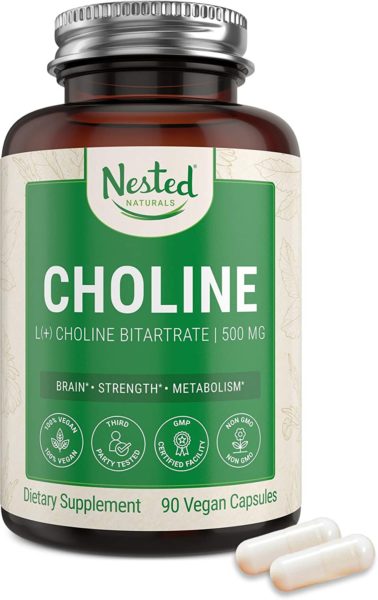
Nested Naturals has a very pure choline supplement with a solid, middle of the road dosage. Each vegan-friendly capsule delivers 225 mg of choline, and contains only rice flour as an extra ingredient.
With purity this good, it’s no surprise why its users love it: people praise its purity and its efficacy. With these strengths and no real faults, it’s our number one pick.
2. Standard Process Choline
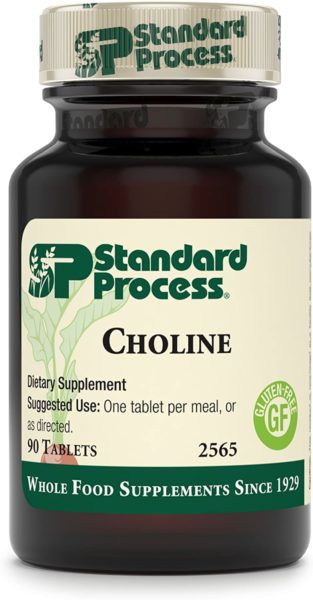
Standard Process makes a 175 mg choline supplement that uses only natural ingredients in its tablet. The purity and simplicity of this tablet puts many other manufacturers to shame.
With only choline bitartrate, honey, and calcium stearate, these tablets achieve what other companies need half a dozen ingredients or more to do. If you are looking for a lower dose of choline, this is an excellent choice.
3. Doctor Recommended Supplements Choline
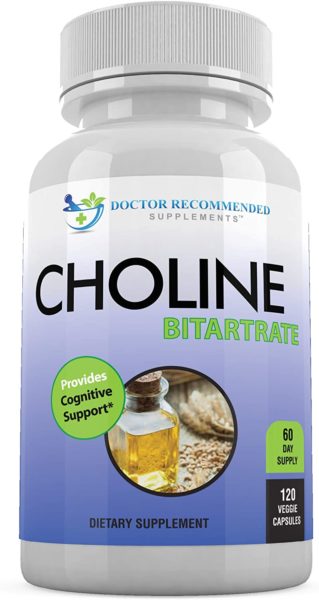
Doctor Recommended Supplements makes one of the better high-dose choline supplements out there, with 500 mg per capsule. The capsules are vegetable-based, and the only other ingredient is rice flour.
While 500mg might be overkill for some people, especially if you already get a lot of choline in your diet, it should be your go-to if you need a high dose choline supplement.
4. Nutricost Choline Bitartrate
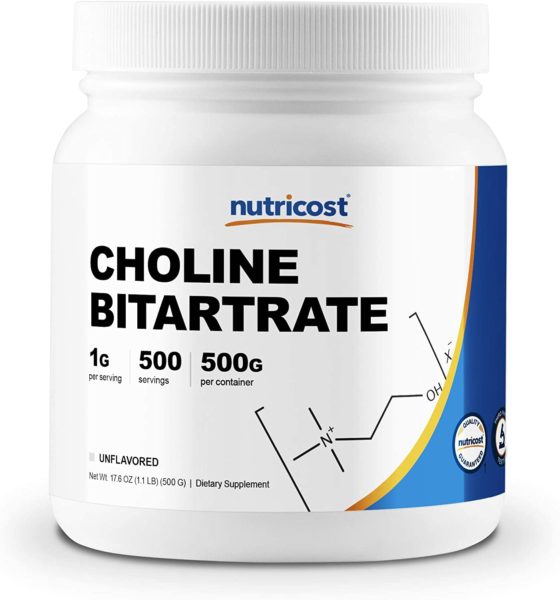
Looking for a powder form choline you can mix into shakes, smoothies, and meal replacements? Nutricost is the best option out there. This powder-form choline lets you choose your own dosage, adjusted to your own nutritional needs, and easily mixes into your beverage or shake of choice.
5. Now Choline & Inositol
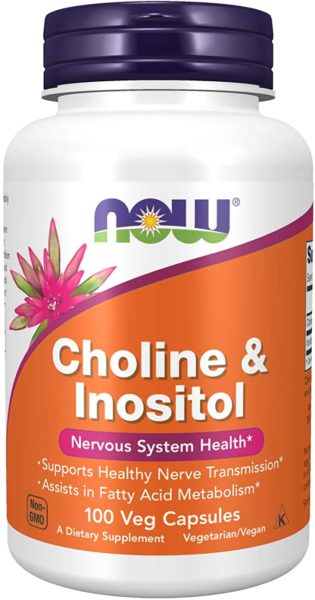
Now Choline & Inositol delivers a 50/50 mix of these two essential nutrients, at 250 mg of each per capsule.
The capsules are made of gelatin, meaning they aren’t suited for strict vegetarians, but on the bright side, the only other ingredient is magnesium stearate to help hold the powder together. If you want inositol as well as choline, it’s a good choice.
6. Nusapure Choline
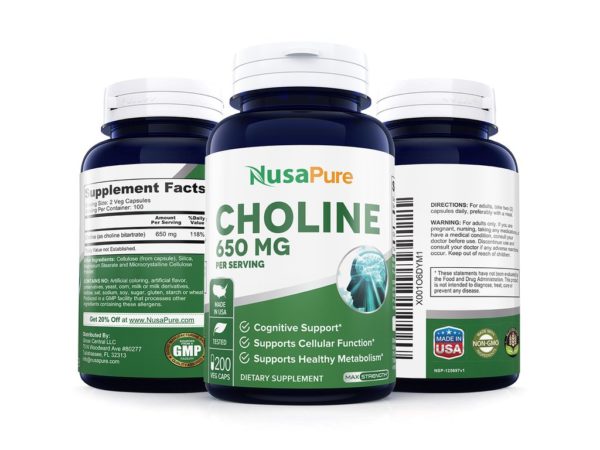
Nusapure makes a choline supplement that uses vegetable cellulose capsule to deliver a hefty 325 mg dose per capsule. While the supplement design is not quite as clean as some of the top competitors, it’s still a good option.
7. Bulksupplements Pure Choline Bitartrate
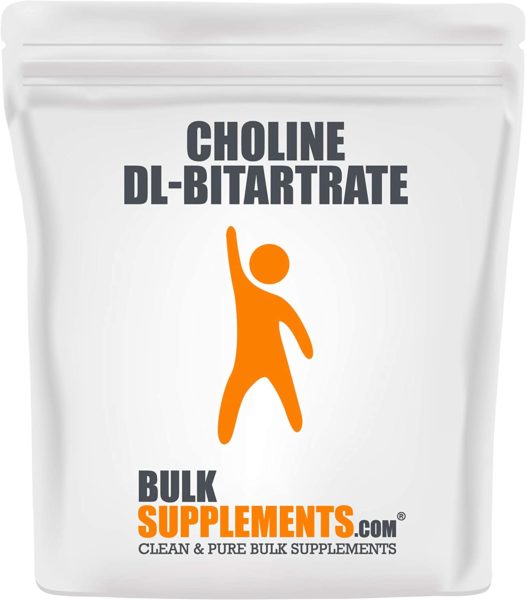
As always, bulksupplements caters to the do it yourselfer with its bulk-sized loose powder forms of popular supplements, and choline is no exception.
If you are cooking up your own meal replacement, protein shake, or nootropic smoothie, it’s a must-have, but most people will want to opt for a product that’s already been measured and proportioned out into tablets or capsules.
Since the necessary intake of choline is measured in milligrams, you’ll need a very accurate scale to be able to accurately parse out the powder on your own.
8. GNC Choline
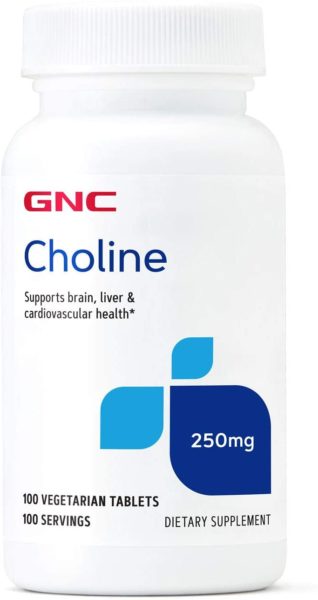
GNC Choline has a fairly respectable 250 mg dose of choline, but it also comes with a few extra additives, like food glaze, that you won’t find in top choline supplements.
It’s a fine choice if all you want is something with 250 mg of choline per serving, and it is vegan-friendly thanks to its cellulose capsule, but fans of cleaner supplement design may want to look elsewhere.
9. Best Naturals Choline
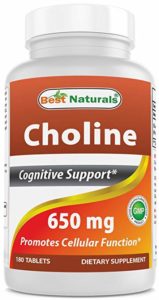
Best Naturals has a choline supplement that delivers 265 mg of choline, which is a bit subpar, especially considering that it’s advertised as a high-dose supplement.
Further, the tablets have a lot of binders, glazes, and other additives that make it pretty heavily laden with extras. It gets beat out on a number of fronts by other choline supplements that are on the market.
10. KRK Supplements Choline-900
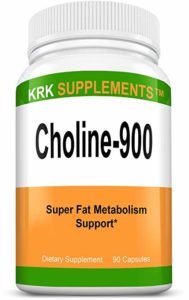
Despite the name, KRK Supplements only delivers 450 mg of choline per tablet—the recommended serving size is two capsules.
It’s got a bit too many extras, like silica, to recommend as a top-tier choline supplement, though the dosage is still higher than some of the competition. Even so, there’s a better option out there for pretty much everybody.
Category winners
Best choline overall: Nested Naturals Choline
With a potent dose and an ultra-clean supplement design, Nested Naturals easily takes the top spot overall. Given the diverse applications of choline supplementation, you’ll want a supplement that’s got the versatility to match, and Nested Naturals fits the bill.
Best choline for liver health: Standard Process Choline
Standard Process makes a simple choline supplement with a moderate dose that’s ideal for liver health. By keeping the dose middle-of-the-road, and excluding any other active ingredients, this choline supplement is less likely to interact with anything else that you’re taking.
Best choline for weight loss: Standard Process Choline
For people losing weight, choline can help combat the negative effects of being overweight, and for this purpose, Standard Process Choline is our recommendation. It’s well-formulated to ensure that your choline levels are high, even if you are limiting your caloric intake.
Best choline for brain health: Nested Naturals Choline
The high dose and uncompromising purity of Nested Naturals Choline makes it the perfect choice for cognitive function, whether your goal is solely to sustain normal brain function, or to boost your memory and cognitive capabilities.
Best choline for women: Nested Naturals Choline
Women who are pregnant or nursing need to substantially increase their choline intake to ensure the health of their infant. One way to do this is with a prenatal vitamin; another is with a high dose and highly pure choline supplement like Nested Naturals.
Best choline with inositol: Now Choline & Inositol
Combining inositol with choline (which are both neurotransmitter precursors) is an increasingly popular supplementation strategy, especially for nootropic and mental wellbeing purposes. Our pick for these applications is Now Choline & Inositol, which delivers a 50/50 mix of both without sacrificing on dosage or purity.
Who should buy choline?
Choline supplements are a good choice if you are looking for something that may help improve cognitive function and boost liver health. Choline is a precursor to acetylcholine, an important neurotransmitter, and decreases in choline levels are associated with the accumulation of fat in the liver.
While human data is still lacking, there is at least some circumstantial evidence that suggests that choline supplementation could help restore liver function by combating fatty liver disease.
Notably, some animal studies actually suggest that choline supplementation could be a bad idea in cases of alcohol-related liver disease, so be sure to check with your doctor if you know you have alcohol-related liver damage.
As is the case with any supplement, people with fatty liver disease should talk to their doctor first before trying a choline supplement, particularly if they are taking prescription medications.
Choline is also of interest to people looking for a boost in brain function, either for nootropic performance-enhancing reasons or just to preserve brain function as they get older. That’s because choline is a precursor to acetylcholine, which is one of the key neurotransmitters in the brain.
Choline is known to play an important role in the formation and preservation of neurons in the brain, so the strongest case for its use is probably for cognitive function.
How we ranked
Since large randomized trials in humans of the efficacy of choline supplementation are fairly sparse, we focused our rankings on identifying the choline supplements that deliver best on what they promise: a pure, easy to use source of choline, with other ingredients kept to a minimum.
These qualities make a choline supplement easy to use and effective. We started by evaluating all of the choline supplements on the market for their choline content: we were looking for choline supplements that would provide a choline dose that’s appropriate to boost the dietary choline intake of the average person up to the recommended choline intake.
Adult women and adult men are recommended to get 450 and 500 mg of choline per day, respectively, according to the Office of Dietary Supplements at the National Institutes of Health. However, most Americans don’t get enough choline.
According to the same source, American men average 402 mg of choline per day in their dietary intake, while American women average 278 mg per day. Choline does pose risks if taken to excess; the tolerable upper limit for men and women is 3500 mg per day from both diet and supplementation put together.
Our research team used these figures to put together a range of acceptable dosages that we were looking for in the choline supplements we evaluated.
At the bottom end, we required a minimum of 100 mg of choline per serving, since anything less isn’t going to make a significant impact on your progress towards the recommended intake.
At the upper end, we wanted to keep the dosage below 600 mg per capsule, since anything higher could put people with already-high dietary choline intake near or beyond the upper limit. Based on these cutoffs, we eliminated any candidate supplements that were outside this range.
Next up, we evaluated the purity of the remaining supplements. We docked points for extra ingredients: gummy-based supplements, for example, scored worse because of their extra non-biologically active ingredients.
We made an exception for inositol, because some people want to combine the two—though this strategy doesn’t have as much scientific support as using choline alone. As usual, we also docked points for binders, fillers, and anti-caking agents, as these detract from the purity of the supplement.
Finally, we ranked the remaining products based on their dosage, purity, and lack of unnecessary additional ingredients. We were left with our final list of the best choline supplements on the market.
Benefits
Choline is an essential nutrient found in some foods and is taken as a supplement for memory, mood, muscle control and other brain and nervous system functions (1). Choline bitartrate is related to the B-vitamins and serves several vital biological functions throughout the body. One of its roles is to increase choline in the body. The body needs choline to synthesize phosphatidylcholine and sphingomyelin, two major phospholipids vital for cell membranes.
Phosphatidylcholine accounts for about 95 percent of total choline in tissues. Sphingomyelin is found in cell membranes and in the fatty sheath that wraps myelinated nerve fibers (2).
Choline is also needed to produce acetylcholine, a significant neurotransmitter involved in memory, mood, muscle control, circadian rhythm and other neuronal functions.
Choline also plays important roles in modulating gene expression, cell membrane signaling, lipid transport and metabolism, and early brain development (3).
According to the authors of the November 2009 issue of Nutrition Reviews, “choline-deficiency is now thought to have an impact on diseases such as liver disease, atherosclerosis and possibly neurological disorders because of its wide-ranging roles in human metabolism, from cell structure to neurotransmitter synthesis.” (4)
According to one study of healthy adult subjects lacking dietary choline, 77 percent of the men and 80 percent of the postmenopausal women developed signs of fatty liver or muscle damage (5).
Foods rich in choline include eggs (especially yolks), liver (beef and chicken), fish, wheat germ, cruciferous vegetables (Brussel sprouts, cauliflower and broccoli), meat, peanuts and dairy products (6).
One of the reasons why many people are deficient in this important nutrient is that it is found in high cholesterol and high fat foods (such as egg yolks, liver and meat) which are what people tend to avoid for better health.
Choline shows memory-enhancing possibilities. Approximately 5.7 million Americans are living with Alzheimer’s disease and it is the sixth leading cause of death in the U.S. (7). While there are some medications available to help temporarily reduce symptoms, there is currently no cure for the disease. In their ongoing search for effective treatment options and a cure, researchers have long been focusing their attention on the role of choline in treating memory loss.
Loss of cholinergic neurons is associated with impaired cognitive function, particularly memory loss and Alzheimer disease. Brain atrophy and white-matter hyperintensity are also associated with impaired cognitive function and Alzheimer’s.
The long-term effects of dietary choline availability on the rodent’s brain and memory have been investigated extensively. For example, studies have shown that the brain’s acetylcholine concentrations increase after an enriched choline diet and memorization of food locations improve after rats are administered with choline either prenatally, around birth or later in life.
In addition, in cognitively-impaired mice, prenatal choline supplementation also enhances performance in typical attention and memory-related tasks (8).
Building on the promising results in animal studies, researchers theorized that by increasing the amount of choline in the diets of older patients with impaired memory, their memory functioning would improve. However, results of studies in humans have come back with mixed results.
Lecithin and choline chloride (substances containing the chemical structure of choline), did not successfully improve memory performance. However, cytidine diphosphate choline (citicoline) and choline alphoscerate, two alternative compounds that contain choline, seem to be effective in the treatment of progressively declining memory functioning in dementia patients (9,10).
In a study evaluating the effects of citicoline supplementation on the verbal memory of older volunteers, a higher dosage of the supplement was associated with improved immediate and delayed logical memory (11).
Researchers are left with understanding why and which choline-containing substances improve memory. More studies are needed to understand the actual mechanism behind choline supplementation and memory improvement.
Researchers are also interested in studying the potential interactions of other food supplements in memory. They have found that antioxidant, flavonoid, glucose and fatty acid ingestion improve memory functions. Evaluating the administration of a blend of these supplements together with choline may be an important design for future studies.
Choline helps fetal brain development. The brain is at its most vulnerable during critical periods of development, including the last trimester of pregnancy and the first two years of childhood (12). High choline concentrations in the brain and spinal cord are important for neural tube closure and brain development. There is a high rate of transfer of choline across the placenta and it is known that in pregnancy and breastfeeding maternal reserves of choline are depleted.
In a paper published in the Journal of the American College of Nutrition, researchers noted that in studies where rat pups received choline supplements (in utero or during the second week of life), their brain function was changed, resulting in lifelong memory enhancement.
This change in memory function appears to be due to changes in the development of the memory center (hippocampus) in brain.
Another study showed that depriving neonatal rats of maternal contact resulted in altered memory, and that these effects of deprivation could be reversed by choline. Animals treated with supplemental choline during this period exhibited significantly higher memory capacity in adulthood than animals who received choline later (embryonic day 15 to 28) (13).
Choline may be able to improve cognitive deficits associated with fetal alcohol syndrome. Fetal alcohol syndrome causes brain damage and growth problems (motor coordination deficits, hyperactivity and learning deficits) in children as a result of alcohol exposure during the mother’s pregnancy (14).
In a 2000 study, researchers evaluated whether early choline supplementation had the ability to counter the effects of prenatal alcohol treatment in pregnant rats. A visuospatial discrimination task was used for assessment. Group one received a liquid diet containing 35 percent ethanol-derived calories from gestational day 6-20; group two served as a pair-fed control group and the third group served as an ad lib lab chow control.
On postnatal day two, pups were assigned to one of three postnatal treatments: choline, saline vehicle or no treatment.
Ethanol-exposed subjects who were not treated neonatally with choline committed a significantly greater number of errors. Whereas, neonatal choline treatment significantly improved performance on the discrimination task in all groups; however, the beneficial effects of choline were significantly larger in ethanol-exposed subjects.
It is believed that these effects were due to long-term changes in brain and behavioral development (15).
Authors of the study concluded that future studies should try to answer the following: Does the form and amount of choline ingested contribute to variations in memory observed between humans? Does choline supplementation of pregnant women result in babies with enhanced memory? Are the women who are eating low-choline diets and have an increased risk of having babies with a neural defect also at risk of having babies with diminished memory function?
Choline may reduce the risk of neural tube defects in babies when taken during pregnancy. Neural tube defects are birth defects of the brain and spinal cord (16). To help prevent these defects, women frequently take a vitamin supplement that has folic acid. Researchers have also been placing their focus on choline supplementation as a preventive candidate.
In a 2004 study, researchers investigated whether dietary intakes of choline and betaine (a choline metabolite) before conception to early pregnancy influenced neural tube defect risk.
It was found that dietary intakes of choline were associated with reduced neural tube defect risks and risk estimates were lowest for women whose diets were rich in choline, betaine and methionine (17).
A prospective study performed in 2009 including data from more than 180,000 pregnant women in California from 2003 through 2005, revealed that elevated neural tube defect risks were associated with lower levels of total choline, and reduced risks with higher levels of choline (18).
Choline may play a role in treating bipolar disorder. According to the American Psychiatry Association, bipolar disorder cause changes in a person’s mood, energy and ability to function. People diagnosed with this disorder experience extreme and intense emotional mood episodes categorized as manic, hypomanic or depressive (19).
In some small studies choline has been shown to be effective in helping improve symptoms of mania.
A small, open-label study of six patients with treatment-resistant rapid cycling bipolar disorder and stabilized on lithium found that the addition of free choline 2000–7200 mg daily resulted in improvement of manic symptoms (20).
The results of a 2003 randomized controlled trial of oral choline in rapid cycling bipolar patients treated with lithium revealed significantly decreased purine levels in the brain over a 12-week period (21). The body produces uric acid when it breaks down purines, organic chemical compounds. Elevated levels of uric acid are observed in people with mania. Decreasing uric acid, therefore, may help symptoms (22).
While larger studies are needed before recommending use of oral choline as an adjuvant therapy for the treatment of mania in bipolar disorder, early results are promising.
Choline may help prevent and treat liver damage. In the last few years there have been significant advances in the understanding of choline’s effects on liver function. Liver is a central organ responsible for choline metabolism and humans consuming a diet low in choline may develop fatty liver and liver damage.
The goal of many studies has been to better understand the factors that influence the progression of fatty liver disease to steatosis, fibrosis, cirrhosis and liver cancer.
Researchers have learned that choline deficiency in humans is associated with liver dysfunction and susceptibility is dependent on factors, including genetics, gender and the gut microbiome, which influence choline requirements (23).
Choline may help recovery after a stroke. Folates (B-vitamins) play an important role in brain function and deficiencies are linked to increased risk of developing a stroke. Researchers taking part in a 2017 study attempted to understand the role of B-vitamins in stroke pathology using mice models.
Mice were maintained on a folic acid deficient diet for four weeks prior to ischemic damage to increased levels of plasma homocysteine — a risk factor for stroke. Post-operatively, mice were placed on a B-vitamin and choline supplemented diet for four weeks.
In supplemented diet mice, an improvement in motor function after ischemic damage was evident compared to mice fed a control diet after ischemic damage.
In addition, there was enhanced proliferation, anti-oxidant activity and neuroplasticity in mice fed the supplemented diet (24). Neuroplasticity is defined as the capacity of neurons and neural networks in the brain to change their connections and behavior in response to new information, sensory stimulation, development, damage or dysfunction (25).
Side effects
Excessive consumption of choline (greater than 7,500 mg) has been associated with low blood pressure, sweating, fishy body odor and gastrointestinal side effects such as nausea, vomiting and diarrhea (26).
Some researchers have hypothesized that excessive choline could increase your risk for heart disease. That’s because bacteria in your stomach and intestines can metabolize choline (as well as L-carnitine) into a substance called trimethylamine N-oxide, or TMAO. TMAO has been linked to the development of blood clots, increases in blood pressure, and alterations in the processing of cholesterol (27).
However, this link is controversial; for example, a recent study in the American Journal of Clinical Nutrition did not find a link between dietary choline content and blood pressure in a representative sample of almost 10,000 Americans (28).
Still, it’s worth considering the potential effects of long-term choline supplementation on your risk factors for cardiovascular disease, particularly if you know you have other lifestyle factors that increase your risk.
Talking to your doctor about choline supplementation before starting is a good idea if you are concerned with the potential effects on your TMAO levels and heart disease risk.
Recommended dosage
According to the National Institutes of Health, adequate intake for adults is 550mg daily for men and breastfeeding women; 425mg daily for women; and 450mg daily for pregnant women (29).
The daily maximum safety limit for adults is believed to be 3,500 mg per day. For children age 1 to 8, the maximum is 1,000mg; the maximum for 9 to 13 years is 2,000mg; and the maximum for 14 to 18 years is 3,000mg.
FAQ
Q: What foods are high in choline?
A: Choline can be found in many animal-based foods, like eggs, fish, red meat, poultry, and liver. If you are looking for a vegan source of choline, nuts and seeds are a good option: one serving of peanuts, for example, contains 24 mg of choline.
Almonds, cashews, and pistachios are also good sources of choline that are not animal-based. If you are vegetarian or vegan and are looking to get more choline in your diet, a supplement is another option to easily boost your intake.
Q: How does the body make choline?
A: The human body is capable of making choline in the liver, but it can’t make enough for all of your body’s needs. That’s why you need dietary choline.
The National Institutes of Health recommend getting 425 mg per day for adult women, and 550 mg per day for adult men. Supplementation or dietary changes are fairly easy to make in order to hit this recommended intake, even though the majority of Americans do not get enough choline in their typical diet.
Q: Is choline vegan?
A: Choline is just a simple molecule, and it isn’t solely found in animal sources, so it can definitely be considered a vegan supplement. However, actually getting adequate choline levels in your diet can be very tricky if you are vegetarian and particularly difficult if you are vegan.
That’s because many of the best dietary sources of choline are animal products like eggs, red meat, fish, and poultry. Nuts and seeds can be a decent source of choline, but the concentration of choline is far lower than in animal products.
For vegans, a choline supplement might be a good idea if you don’t think your diet is allowing you to hit the recommended intake.
If you want to be as strict as possible with avoiding animal products, opt for a choline supplement that uses plant-based cellulose as opposed to animal-based gelatin capsules.
Q: Is choline in peanuts?
A: Yes, peanuts are one of the best vegan-friendly choline sources, with approximately 24 mg per quarter-cup serving.
Other good vegan-friendly sources of choline include soybeans, shiitake mushrooms, red potatoes, beans, and quinoa, all of which have as much or more choline per serving as peanuts.
Still, with a recommended daily intake of 425 mg for women and 550 mg for men, it can be difficult to use nuts, seeds, legumes, and other plant based sources as your sole source of choline, which is why supplements are popular with vegetarians and vegans.
Q: Is choline good for your liver?
A: Choline is thought to help protect you from nonalcoholic fatty liver disease, based on epidemiological research that has connected high dietary intake of choline with a low lifetime risk of fatty liver disease, and vice versa.
Choline deficiency also causes problems in the liver which are reversed once choline intake returns to healthy levels (29).
However, the exact biochemistry of how choline may protect your liver is controversial. Animal studies do not support the ability of choline to protect your liver from alcohol-related liver damage, for example (30).
Q: Is phosphatidylcholine the same as choline?
A: No, phosphatidylcholine is a category of molecules that makes up the cell walls of plants and animals, and incorporates choline as part of the molecule.
Choline is an important precursor to phosphatidylcholine, though, and many nutrition experts who tout the benefits of choline point to phosphatidylcholine synthesis as one of the important applications of choline.
Q: How is acetylcholine different from choline?
A: Acetylcholine is a neurotransmitter that is a potent nootropic both for sustaining brain function as you get older and for boosting brain power now.
As the name suggests, it’s structurally very similar to choline, and indeed is synthesized inside your body by combining choline and acetyl coenzyme A.
Research in lab animals suggests that increased availability of choline will lead to increased release of acetylcholine when neurons fire, which motivates many people to take choline for cognitive benefits and may explain the link between choline intake and cognitive function that’s been seen in some studies (31).
Q: Can choline reverse fatty liver disease?
A: Choline does appear to play a role in fatty liver disease, but the relationship is far more complex than previously thought.
Initial results from people on total parenteral nutrition was able to demonstrate that a lack of dietary choline caused liver damage, and that this liver damage was reversed when choline was added back into the diet (32).
However, not all studies agreed; and some animal studies even found that high choline intake could be toxic to the liver (33).
These discrepancies appear to be related to previously-unknown complexities with how the human body uses and processes choline. According to a 2016 scientific paper published in the journal Advances in Nutrition, low choline availability in the liver does indeed accelerate the progression of liver damage and liver disease, but low choline intake is not the only reason for low choline availability in the liver.
Certain genes change the way choline is processed in your body, and different distributions of bacteria in your digestive system change what happens to the choline you consume.
The authors conclude that different people will likely have different optimal choline intake levels, and that it will take substantial further research to develop individualized recommendations on how to use choline to treat, prevent, or reverse fatty liver disease.
For now, all we can say is that choline appears to be related to liver health, and that you should discuss your choline intake with your doctor if you think that it might be related to liver problems.
Q: How long does it take for a choline supplement to start working?
A: Choline has a very interesting absorption profile, according to research that has used specially labeled choline to track its biochemical routing inside the body (34).
Choline levels in the blood show one initial peak at one hour, indicating that at least part of a choline dose is absorbed very rapidly by the body. However, a larger and later peak occurs at 24 hours post-ingestion of a choline supplement, indicating that most of the choline that you take in a supplement takes a little while to start circulating through your body.
Interestingly, almost no choline passes through your digestive tract unprocessed. This might be because of choline-consuming bacteria in your body that consume choline as it makes its way through your digestive tract, in addition to your body’s own absorption processes.
These results suggest that choline supplementation should start to have an effect within a few days, though many of the potential applications of choline supplementation, like preventing birth defects, are based on sustaining high levels of choline for longer periods of time.
Related articles
Recap
Choline bitartrate is an essential nutrient that serves several vital biological functions throughout the body. The body needs choline to synthesize phosphatidylcholine and sphingomyelin, two major phospholipids vital for cell membranes.
Choline is related to the B-vitamins and is also a precursor to acetylcholine, a significant neurotransmitter involved in neuronal functions. This nutrient is naturally found in several foods (mainly egg yolks, liver, meats and wheat germ) and is taken as a supplement for memory, mood, muscle control and other brain and nervous system functions.
Several clinical studies performed have shown its potential in treating and preventing various conditions. Early dietary interventions may reduce the severity of fetal alcohol effects, and high choline concentrations in the brain and spinal cord are important for neural tube closure and brain development in babies.
Choline has been shown in small studies to be effective in improving manic symptoms in bipolar patients. Although larger studies are needed, researchers are optimistic that use of oral choline may be a potential future adjuvant therapy for treating symptoms of this mental disorder.
In addition, there is believed to be a link between humans consuming a diet low in choline and the development of nonalcoholic fatty liver disease and liver damage.
For BodyNutrition’s #1 choline recommendation, click here.